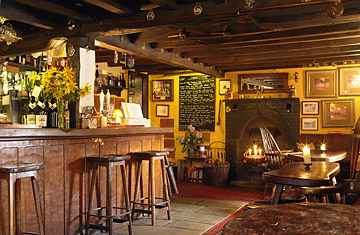
A traditional pub in England.
Ten years ago, James Herring was the barman at the Flag and Firkin, an imposing Georgian pub a stone's throw from Watford Junction, a half-hour train ride from central London. "We were the flagship pub for Firkin [Britain's largest brewer]. We had loads of funding for staff and promotions and Firkin kept the place looking nice. In those days, we were packed." The Flag, as has been known since the Firkin Brewery went out of business in 2001, is owned by Mitchell and Butler, the leading operator of pubs and pub restaurants in the U.K. Before Christmas, Mitchell and Butler announced the pub would close in the New Year. Two weeks ago, they were given a reprise until the fall — but the place is falling apart.
Frantic efforts to draw in new customers through a variety of marketing tactics appear to give the Flag something of an identity crisis: Slot machines glow in one corner; another looks like a homely living room; garish posters advertise budget meals; flat screens hang ready for televised sports; a bar runs the length of the pub to a small stage that showcases local rock bands. But, the vast pub is empty. Says Herring, "They know we are closing so they won't even renew Sky Sports [the subscription TV channel that carries Premier League soccer]."
The Flag is not alone, however. The Campaign for Real Ale, CAMRA, estimates that 60 pubs close every month in Britain. According to industry figures, a smoking ban implemented during one of the coldest and wettest summers in decades resulted in a 10% drop in beer consumption. CAMRA says energy costs rose during months when owners hadn't expected to have to pay for heat. And beer production costs have risen thanks to the rains that drowned hops and barley yields. For many pubs, serving food has become the key to survival. The Office of National Statistics indicates that Britons spend an annual $60 billion on alcohol in bars, while the nation's eating out tab amounts to $84 billion. Food now accounts for 37% of the sales of the Mitchell & Butler chain, compared with beer at 31%.
Regulars congregate at Kevin Moran's, formerly the Nag's Head, an historic watering hole in stylish Belgravia, to enjoy its open fireplaces in the winter or summertime flowers bursting from the window boxes on its charming Dickensian façade. But Moran says he sees the pub recession just down the road. "There's the Moore Arms — you wouldn't even know it was a pub now — it closed two years ago. Up from there's the Australian — that's been turned into apartments. Opposite, the Shaftsbury Arms is now a Baker and Spice [bakery chain] underneath and flats above. Around the corner is the Blenheim Arms, which is closed — that's going to be bulldozed. My pub, the Man in the Moon is gone; it's now a Chinese cocktail bar. The Phene Arms which is a famous George Best local, is gone. [Best was a legendary soccer star and party animal.] The Surprise, which is a Chelsea pensioner's pub in Royal Hospital Road, just closed."
It's not that the British are necessarily drinking all that much less; it's where they're doing their drinking that's hurting the country's 98,000 pubs. The British Beer and Pub Association claims beer sales at the pub are at their lowest level since the Great Depression — today British pubs sell 14 million pints per day, half the total dispensed at their peak in 1979. And when beer profit is eroded, pubs suffer. The publican at the Greene King in Marylebone says, "It is not just the smoking ban that is contributing to the closures, it is also how cheaply beer is sold at the supermarkets. It's cheaper to buy a can of beer than it is to buy a bottle of water." Herring paints the picture of a new domestic alternative to a pint down the pub: "Now, you've got Sky Plus [satellite TV sports channel] and a nice big plasma screen, a keg on tap; you invite a few friends around and you can smoke. Who needs the pub?" A November report on the pub industry by equity analysts Kaupthing Singer & Friedlander Capital Markets confirms the thesis that the decline in pubs' beer sales reflects a shift to consumption at home, as well as attitudes to drunk driving and a tightening up on underage drinking in pubs.
The pub industry and its customers have, of course, survived many changes over the years, from the brewery breakup of the 1990s to the seismic shift away from cask ale and beer to lager; and from proprietary ownership to chain-owned pubs. If the New York experience is any indication, the smoking ban will hurt most in the first year, but new customers will emerge to take advantage of the benefits of a smoke-free environment. And while many pubs are closing, there are also new ones opening. The new tenants of the Greene King are bullish: "We wouldn't enter the market unless we thought we could survive." And there are still plenty of Britons who'll drink to that.
